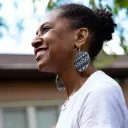Stay in the Loop
BSR publishes on a weekly schedule, with an email newsletter every Wednesday and Thursday morning. There’s no paywall, and subscribing is always free.
With a little help from the Internet: Black classical music rears its head
A voice for black classical musicians

My friend the soprano Randye Jones used to think of herself as an anomaly: an African-American who loved to perform and study classical music. You couldn't blame her for this impression: Even black-oriented broadcasting stations, and publications like Jet, Essence and Ebony ignore classical musicians each year when Black Music Month rolls around.
Randye doesn't remember a time when she wasn't a musician— she sang in choirs at school and at church, in addition to playing the flute from second grade through post-secondary school. But not until her freshman year in the music program at Bennett College in North Carolina did Randye learn that there were indeed a number of other black classical musicians out there, and that their ranks included such luminaries as Marian Anderson and Leontyne Price, not to mention William Grant Still and Harry T. Burleigh. Still, the vast majority of the composers and performers she studied had Western European ancestry.
In the first semester of her graduate studies at Florida State University, the musicologist Dominique-Rene de Lerma came to the campus to teach classes on black music, and Randye studied with him. The result was a greater appreciation not just for the music of black composers, but also for their perseverance in overcoming discrimination.
Searching for spirituals
Randye's time with de Lerma sparked a lifelong interest in African-American music. Since Randye already had a background in Negro spirituals, she gravitated toward this very rich body of literature. Still, many scores were out of print, never published or very difficult to find.
In the 1990s, Randye's search for information led her to the Internet— and more disappointment, when she was unable to find any sites that focused on African-American music. In 1999 she took matters into her own hands, launching Afrocentric Voices , a site devoted to classical vocal music by black composers.
At first the site included just a few biographies, a bibliography and some links to related sites. Since then, Afrocentric Voices has incorporated more information, a place for African-American singers to network, and a chronology of achievements in African-American vocal music.
Porgy and Bess: Controversial, but…
The most recent addition, in December 2008, is Afrocentric Voices Radio, a Web-based radio service. Each month, Afrocentric Voices Radio features a theme. The month of September paid tribute to the 74th anniversary of the premiere of George Gershwin's Porgy and Bess— a controversial opera that, notwithstanding the negative black stereotypes created by its white composer and author, has nurtured the careers of numerous African American singers, including the original Porgy and Bess (Todd Duncan and Anne Brown) as well as William Warfield, Simon Estes, Leontyne Price and Grace Bumbry.
In October, the theme is male African-American classical singers, who have often had even more difficulty establishing themselves than females, especially in opera. Other future themes include Christmas recordings in December (such as Giancarlo Menotti's Amahl and the Night Visitors, featuring Willis Patterson) and a tribute to Grace Bumbry, in recognition of this mezzo-soprano's selection as one of this year's Kennedy Center honorees.
What's "'classical,' exactly?
But Randye's vision spreads far beyond the familiar. She has programmed recordings by performers from the earliest days of recorded music: groundbreakers such as George Walker's Pulitzer Prize-winning Lilacs, and composers whose music has probably never been broadcast before. One of her monthly themes was called "Future Voices," featuring young professionals and students just beginning their careers.
Randye's definition of classical music is fluid enough to embrace recordings of Margaret Tynes singing Duke Ellington or Muriel Smith singing "Bali Hai" from South Pacific.
The fund-raising challenge
Randye reports that her new station has found a loyal audience, despite its narrow focus and its almost total reliance on word of mouth publicity. (It was an email solicitation for material that first brought Afrocentric Voices Radio to my attention). Randye is far from wealthy, and her expenses (mostly service fees and recording and software purchases) must be covered by donations from a small circle of friends and supporters.
If her station grows and flourishes, Randy hopes, other programmers on mainstream broadcast stations will expand their offerings to include material that is currently found only in Randye's little website. That's a dream that classical music lovers of all races and backgrounds can applaud.
Randye doesn't remember a time when she wasn't a musician— she sang in choirs at school and at church, in addition to playing the flute from second grade through post-secondary school. But not until her freshman year in the music program at Bennett College in North Carolina did Randye learn that there were indeed a number of other black classical musicians out there, and that their ranks included such luminaries as Marian Anderson and Leontyne Price, not to mention William Grant Still and Harry T. Burleigh. Still, the vast majority of the composers and performers she studied had Western European ancestry.
In the first semester of her graduate studies at Florida State University, the musicologist Dominique-Rene de Lerma came to the campus to teach classes on black music, and Randye studied with him. The result was a greater appreciation not just for the music of black composers, but also for their perseverance in overcoming discrimination.
Searching for spirituals
Randye's time with de Lerma sparked a lifelong interest in African-American music. Since Randye already had a background in Negro spirituals, she gravitated toward this very rich body of literature. Still, many scores were out of print, never published or very difficult to find.
In the 1990s, Randye's search for information led her to the Internet— and more disappointment, when she was unable to find any sites that focused on African-American music. In 1999 she took matters into her own hands, launching Afrocentric Voices , a site devoted to classical vocal music by black composers.
At first the site included just a few biographies, a bibliography and some links to related sites. Since then, Afrocentric Voices has incorporated more information, a place for African-American singers to network, and a chronology of achievements in African-American vocal music.
Porgy and Bess: Controversial, but…
The most recent addition, in December 2008, is Afrocentric Voices Radio, a Web-based radio service. Each month, Afrocentric Voices Radio features a theme. The month of September paid tribute to the 74th anniversary of the premiere of George Gershwin's Porgy and Bess— a controversial opera that, notwithstanding the negative black stereotypes created by its white composer and author, has nurtured the careers of numerous African American singers, including the original Porgy and Bess (Todd Duncan and Anne Brown) as well as William Warfield, Simon Estes, Leontyne Price and Grace Bumbry.
In October, the theme is male African-American classical singers, who have often had even more difficulty establishing themselves than females, especially in opera. Other future themes include Christmas recordings in December (such as Giancarlo Menotti's Amahl and the Night Visitors, featuring Willis Patterson) and a tribute to Grace Bumbry, in recognition of this mezzo-soprano's selection as one of this year's Kennedy Center honorees.
What's "'classical,' exactly?
But Randye's vision spreads far beyond the familiar. She has programmed recordings by performers from the earliest days of recorded music: groundbreakers such as George Walker's Pulitzer Prize-winning Lilacs, and composers whose music has probably never been broadcast before. One of her monthly themes was called "Future Voices," featuring young professionals and students just beginning their careers.
Randye's definition of classical music is fluid enough to embrace recordings of Margaret Tynes singing Duke Ellington or Muriel Smith singing "Bali Hai" from South Pacific.
The fund-raising challenge
Randye reports that her new station has found a loyal audience, despite its narrow focus and its almost total reliance on word of mouth publicity. (It was an email solicitation for material that first brought Afrocentric Voices Radio to my attention). Randye is far from wealthy, and her expenses (mostly service fees and recording and software purchases) must be covered by donations from a small circle of friends and supporters.
If her station grows and flourishes, Randy hopes, other programmers on mainstream broadcast stations will expand their offerings to include material that is currently found only in Randye's little website. That's a dream that classical music lovers of all races and backgrounds can applaud.
What, When, Where
Afrocentric Radio. www.afrovoices.com.
Sign up for our newsletter
All of the week's new articles, all in one place. Sign up for the free weekly BSR newsletters, and don't miss a conversation.

 Maria Thompson Corley
Maria Thompson Corley